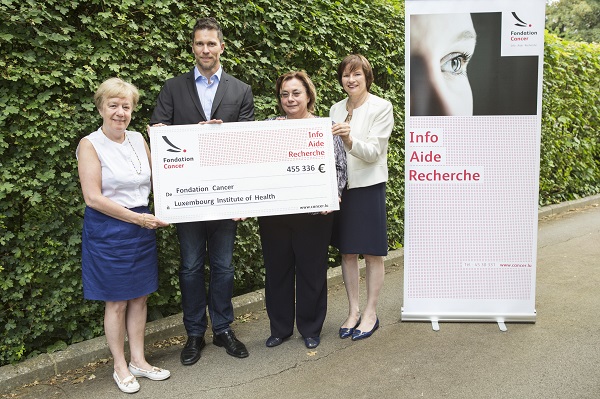
On Thursday, the Fondation Cancer donated €455,336 to the Luxembourg Institute of Health for a research project on breast cancer.
Under the framework of support of research, Dr Danielle Hansen-Koenig, Vice President of the Fondation Cancer, and Lucienne Thommes, Director of Fondation Cancer, presented the cheque to researcher Dr. Clement Thomas, in the presence of Dr. Catherine Larue, director of the Luxembourg Institute of Health (LIH). This research project aims to study the formation of metastases in breast cancer.
Breast cancer is the most frequently diagnosed cancer in women. As in most other cancers, the formation of metastases (secondary tumors) is the leading cause of death from breast cancer (90%). However, to date there is no targeted therapy to prevent metastasis.
During an early stage of metastasis, tumour cells acquire an 'invasive' character in which to leave the primary tumour, infiltrate neighbouring tissue and literally digest the physical barriers, such as the lining of blood vessels and lymphatics. Invasiveness of tumour cells is associated with the formation of membrane protrusions, called invadopodia (literally "invasive feet") that allow them to work their way through tissue. Thus, invadopodia represent a promising therapeutic target to block the metastatic process. The team of Dr. Thomas Clement belongs to the 'Laboratory of Experimental Cancer Research' that is particularly interested in proteins that control the assembly and stabilisation of the "skeleton" of invadopodia (the actin cytoskeleton), with the objective of identify molecular targets for inhibiting the formation or activity of invadopodia in breast cancer cells.
The support of the Fondation Cancer will contribute to the continuation of this research programme which has already yielded promising results. In particular, the research team will study how factors of the tumour microenvironment, such as oxygen reduction at the primary tumor (hypoxia), influence the production and activity of certain proteins of the actin cytoskeleton involved in training of invadopodia and trigger through this metastatic process. Eventually, the inactivation of these proteins could, in combination with current treatments, prevent the formation of metastases.








